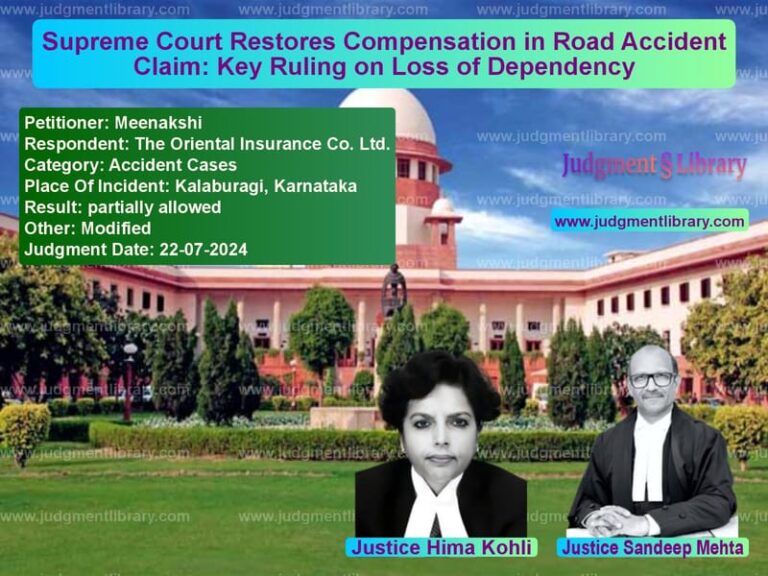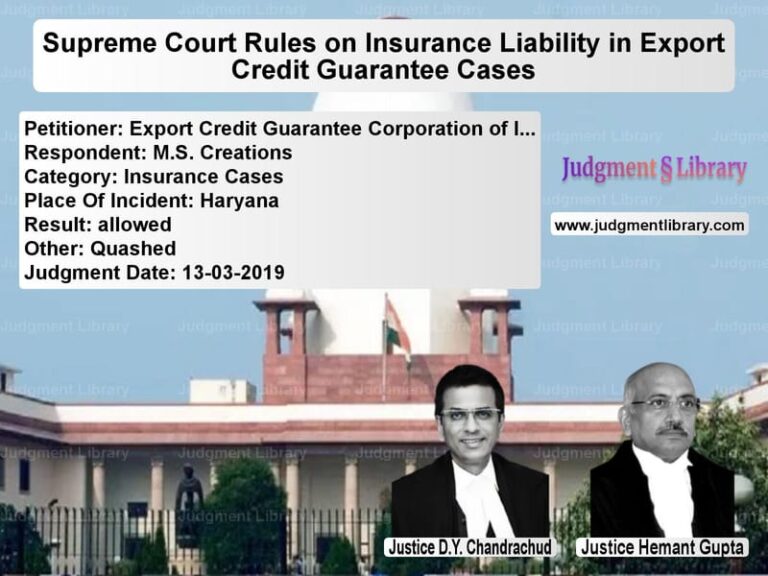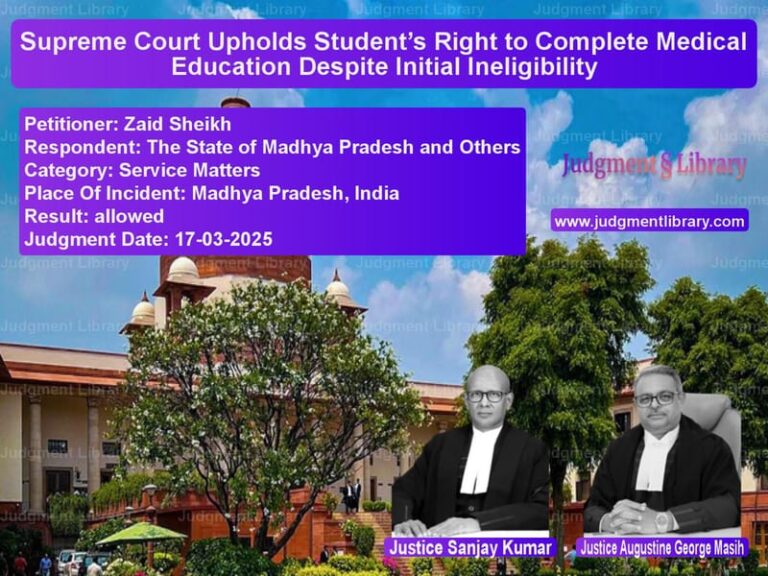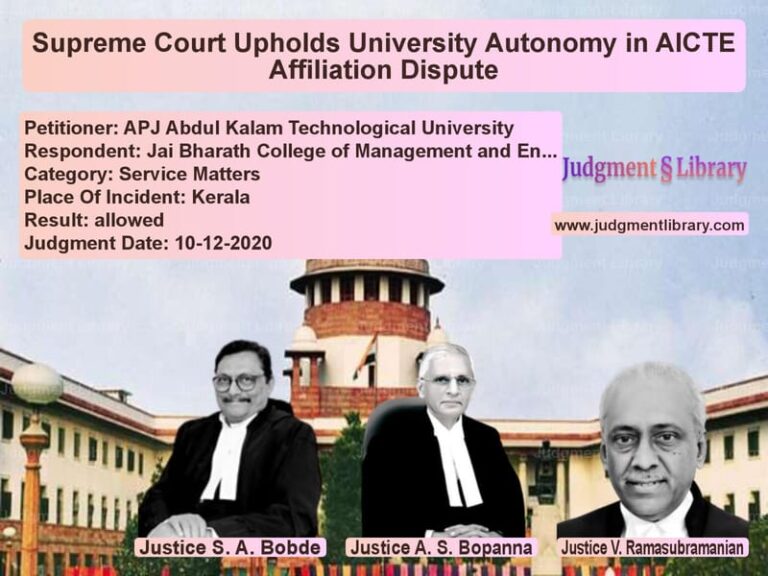General Power of Attorney Holder’s Role in Legal Proceedings: A Case of Res Judicata
This case concerns the role of a General Power of Attorney (GPA) holder in representing a party in legal proceedings and the capacity in which the appellant’s wife, who is also an enrolled advocate, could represent him in court. The appellant, S. Ramachandra Rao, sought to appeal against a decision of the High Court which disapproved the earlier orders allowing his wife to represent him as a GPA holder in the ongoing civil proceedings. The matter revolves around whether a GPA holder, also an advocate, can act both in a professional capacity as an advocate and as a representative under the power of attorney. The Supreme Court’s judgment examines the applicability of the doctrine of res judicata, the scope of Section 32 of the Advocates Act, and the permissible roles of a GPA holder who is also a legal professional.
Background:
The appellant filed Civil Appeal Nos. 7691-7694 of 2022 after the High Court disapproved the orders passed by the Trial Court which had allowed the wife of the appellant, who was a GPA holder and an enrolled advocate, to represent him in the court proceedings. These appeals arose from the orders passed in Civil Revision Petition Nos. 758, 759, 760, and 761 of 2019 by the High Court of Andhra Pradesh at Amaravati. The main issue was the capacity in which the appellant’s wife could appear and act on his behalf in the civil suits. The appellant’s wife, although an advocate, was acting as his GPA holder and sought permission to represent him in the legal proceedings. The High Court, however, had held that as an advocate, she could not act as a GPA holder in the same case, and that the two roles could not be combined.
Appellant’s Arguments:
The appellant, represented by senior counsel, argued that the High Court had misdirected itself by dismissing the earlier orders passed by the Trial Court, which had allowed his wife to represent him in person as his GPA holder. The appellant’s counsel contended that there was no statutory bar preventing the wife from acting as a GPA holder, even though she was an advocate. The argument was based on the premise that the wife was acting in her personal capacity as a GPA holder and not as a professional advocate in the matter. The appellant emphasized that the wife had been representing him throughout the litigation as his GPA holder and that no prohibition existed for a GPA holder, even if an advocate, from appearing in a court, provided that the court allows it.
The appellant also raised the issue of res judicata, arguing that the matter had already been settled by earlier decisions of the High Court, where the issue of the wife’s dual role had been considered and resolved in favor of allowing her to represent her husband as a GPA holder. The appellant pointed out that these earlier orders, dated 20.04.2018 and 14.12.2018, had conclusively determined that the wife could represent her husband as a GPA holder, and the High Court could not revisit this decision in the present appeals.
Respondent’s Arguments:
The respondents, represented by their counsel, argued that the wife of the appellant, being an enrolled advocate, could not represent her husband in a legal proceeding as a GPA holder. The respondents contended that a lawyer’s role as a GPA holder was distinct from that of an advocate, and the two roles could not be combined. They emphasized that the wife, in her capacity as an advocate, could either appear as an advocate or as a GPA holder, but not in both roles simultaneously.
The respondents also raised concerns regarding the conflict of interest, stating that a lawyer who appears as a GPA holder might be subject to ethical conflicts and may not be allowed to act in both capacities. They referred to the decision in the Madupu Harinarayana case, where the Court had restricted the GPA holder from acting in the dual capacity of a lawyer and a representative. The respondents further argued that the High Court had rightly disapproved of the orders passed by the Trial Court and held that the wife of the appellant could represent her husband only as an advocate and not as a GPA holder.
Court’s Analysis:
The Supreme Court thoroughly examined the issues raised by both parties, focusing on the applicability of Section 32 of the Advocates Act, which grants a court the discretion to permit non-advocates to appear in a particular case. The Court also considered the principle of res judicata, which bars the reopening of issues that have been conclusively decided in previous proceedings. The Court noted that the earlier orders of the High Court, which had allowed the wife of the appellant to appear as a GPA holder, were binding and could not be re-examined.
The Court further considered the role of the wife of the appellant, an advocate, and whether she could simultaneously hold the dual roles of a GPA holder and an advocate. The Court acknowledged that the wife had been representing her husband as a GPA holder and that the Trial Court had allowed her to continue in this capacity. However, the Court emphasized that while an advocate may not represent a client as both a GPA holder and a lawyer simultaneously, there was no statutory prohibition preventing the wife from appearing in court as a GPA holder. The Court cited the decision in the Madupu Harinarayana case but distinguished it on the grounds that the issue in that case was whether a non-advocate could act as a representative, whereas in the present case, the wife was already a GPA holder, and her role was limited to representing her husband without acting as an advocate.
Judgment:
The Supreme Court allowed the appeal, setting aside the High Court’s order. The Court reinstated the earlier orders passed by the Trial Court, which allowed the wife of the appellant to represent him as a GPA holder in the civil proceedings. The Court clarified that while the wife could not act as an advocate and a GPA holder in the same proceedings, there was no legal bar against her representing her husband as his GPA holder. The Court emphasized that the previous orders of the High Court, which had allowed the wife to represent her husband in this capacity, had attained finality and could not be revisited.
The Court further held that the issue of the wife’s dual role had already been conclusively settled by the High Court in the previous rounds of litigation, and the principle of res judicata applied in this case. Therefore, the Court allowed the appellant’s appeal and restored the Trial Court’s decision, which permitted the wife to continue representing her husband as a GPA holder.
Conclusion:
This case reaffirms the importance of the doctrine of res judicata and the principle that once an issue is conclusively decided in legal proceedings, it cannot be reopened. The Supreme Court’s judgment emphasizes that while an advocate can represent a client in a legal proceeding, the role of a GPA holder is distinct and can be exercised without conflict of interest. The decision highlights the need to balance procedural rules with the principles of justice and fairness, particularly in cases where the representation is made by a spouse acting in a personal capacity.
Petitioner Name: S. Ramachandra Rao.Respondent Name: S. Nagabhushana Rao & Ors..Judgment By: Justice Dinesh Maheshwari, Justice Aniruddha Bose.Place Of Incident: New Delhi.Judgment Date: 19-10-2022.
Don’t miss out on the full details! Download the complete judgment in PDF format below and gain valuable insights instantly!
Download Judgment: s.-ramachandra-rao-vs-s.-nagabhushana-rao-supreme-court-of-india-judgment-dated-19-10-2022.pdf
Directly Download Judgment: Directly download this Judgment
See all petitions in Contract Disputes
See all petitions in Property Disputes
See all petitions in Specific Performance
See all petitions in Judgment by Dinesh Maheshwari
See all petitions in Judgment by Aniruddha Bose
See all petitions in allowed
See all petitions in supreme court of India judgments October 2022
See all petitions in 2022 judgments
See all posts in Civil Cases Category
See all allowed petitions in Civil Cases Category
See all Dismissed petitions in Civil Cases Category
See all partially allowed petitions in Civil Cases Category







